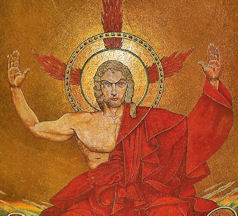“Of that day or hour, no one knows.” (Mark 13:32)
Let’s take a short quiz. The first question is a general one: what goals do you have for your life? The second is a bit more specific: what are your goals for the next five years? And the third is even more specific: what are your goals for the next year? Take a few minutes to write down your answers.
Now one final question: imagine that you knew Jesus was coming back tomorrow. How would your responses to the previous three questions differ? When a friar asked St. Francis what he would do in this situation, Francis, who was gardening at the time, said: “I would keep hoeing my garden.”
What about you? Would you keep going about your business? Most of us would make some last-minute changes. The lines at the confessional booth would probably reach out the church door and down the street for a few miles. Local parishes would run out of hosts because of the many people coming in for their last Mass. The phone lines would probably be jammed with people calling family and friends trying to make eleventh-hour reparations. What about that last call to the poor? With no need to keep food stocked up, we can hope that people would be willing to give more to those who are hungry—sort of a last meal for the poor.
But this is all fanciful speculation. Jesus told us that no one knows when the end will come—even he doesn’t know! So our best strategy is to live each day as if it were our last. We should try our best always to be at peace with the Lord and with the people around us. We should also make sure we are taking care of the needy in our midst. Then, whenever Jesus returns, we’ll pass the quiz with no problem at all.
“Lord, help me to keep my eyes open for your presence and my heart fixed on you. Lord, I want to be ready to greet you when you come again in glory!”
Daniel 12:1-3; Psalm 16:5, 8-11; Hebrews 10:11-14, 18
Questions for Reflection or Group Discussion
1. As the Church approaches the end of the liturgical year we are asked to focus on the very difficult subjects of death and judgment and sin. This week is a good time to pause and reflect on the reality of sin’s inroads within us. What particular steps can you take this week to let God’s light shine on any areas of darkness in your mind and heart and to reveal more deeply the sad reality of sin?
2. In the first reading. we are reminded that at the resurrection of the dead, “some shall live forever, others shall be an everlasting horror and disgrace” (Daniel 12:2). What is your reaction to the words the author of Daniel uses to describe Hell? In what way is it or isn’t it in line with your own image? In the light of God’s holiness and judgment on sin, and the graphic description of Hell used in the reading, what new steps can you take to grow in your relationship with the Lord and to grow in holiness?
3. In the Responsorial Psalm, we are told of the confidence we should have in God who blesses his “faithful one.” How does the Psalmist describe those blessings? How would you describe the ways the Lord has blessed your life?
4. In the Letter to the Hebrews, we are again reminded that we don’t face judgment in fear and trepidation, but in confidence, knowing that Christ has already paid the price for our sins: “one sacrifice for sins.” What impact does this truth have on how you live out your life? What are some areas of your life where the Lord may be asking you to be more trusting and confident in his love and in the work of the Cross?
5. The Gospel reading exhorts us to be watchful regarding “signs” of Jesus’ second coming. What are some of the differences between Jesus first coming and his second coming? What do you think are some of the signs of his second coming? In what ways does reflecting on Jesus’ second coming give us joy and hope? How can you as a Catholic better prepare for his second coming?
6. The meditation asks us to consider how we would respond, and what would we do, if we “knew Jesus was coming back tomorrow.” How would you respond? Why?
7. Take some time now to pray and ask for the grace to be ready for his return, no matter when Jesus Second Coming occurs. Use the prayer at the end of the meditation as the starting point.
